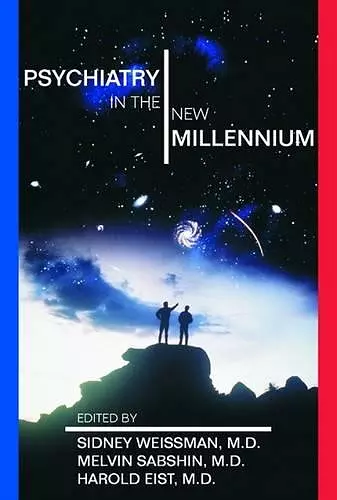Psychiatry in the New Millennium
Sidney H Weissman editor Harold Eist editor
Format:Hardback
Publisher:American Psychiatric Association Publishing
Published:31st Jul '99
Currently unavailable, and unfortunately no date known when it will be back

This book escapes the problem of many edited volumes with multiple authors: they often vary in tone and intention from chapter to chapter and the only unity appears to be that they are contained in the same binding. Psychiatry in the New Millennium is well-focused and its overall scope is true to its title. It presents the complex range of contemporary psychiatry without being reductionist or neglecting important historical contributions in favour of the merely new. It balances the newest promises of brain imaging, genetics, and pharmacology with a careful appraisal of the ongoing contribution of the psychotherapies and social issues. It also addresses the pragmatics of service delivery, economics, and the professions. In short, it is remarkably comprehensive in its consideration of a wide variety of theoretical and practical matters. Vivian Rakoff, M.A., M.B., B.S., F.R.C.P.C., Professor Emeritus, Department of Psychiatry, University of Toronto, Toronto, Ontario, Canada It is said that the principles of development to be succeeded into the next century are the advocacy of human rights and the progression and spread of science technology. Psychiatry in the New Millennium provides a chart on the new beginning psychiatry which is based on such principles. Its content is suitable to be called 'the Neo-Meyerian Psychiatry' introjected with development of allied sciences. Masahisa Nishizono, M.D., Professor and Chair, Department of Psychiatry, Fukuoka University School of Medicine, Fukuoka, Japan
In Psychiatry in the New Millennium, psychiatrists and residents alike will find information vital to their understanding of both this century's psychiatric foundations and the next century's new discoveries.
In an era where scientific advances frequently make even the most recent scientific or medical journal articles dated soon after their publication, it is more crucial than ever for practitioners to be able to effectively evaluate new information. Using the millennium as a benchmark for surveying progress in the field, this indispensable volume captures the current state of the discipline and considers its future evolution.
Key chapters by some of the field's most respected practitioners consider the impact of changing conceptual, organizational, and philosophical issues, as well as of neuroscience research findings, on the shape of the discipline. The current and future relevance of psychoanalysis; the role of social psychiatry as translator and bridge between the worlds of treatment, practice, and public policy; and the need for a new multiaxial diagnostic system that addresses motive and meaning as well as the biological and genetic contributions to behavior are just a few of the issues explored.
Other chapters consider the role of genetics and molecular biology in research on mental illness; the potential uses of functional brain imaging in clinical practice; a clinical model for selecting psychotherapy and/or pharmacotherapy; and the challenge of developing research methods for assessing treatment effectiveness. Also examined are issues such as practice guidelines, managed care and the financing of mental health treatment, and the ethical conduct of the psychiatrist.
The book's final chapters survey the psychiatric workforce of today and tomorrow, including its composition and education, and, finally, offer predictions about psychiatry in the next century.
In Psychiatry in the New Millennium, psychiatrists and residents alike will find information vital to their understanding of both this century's psychiatric foundations and the next century's new discoveries.
The book will be valuable both for psychiatric audiences and the broader mental health family. It will stimulate debate and help point the way for psychiatry's leaders to influence and shape psychiatry's future. It is informative regarding lessons to be learned and vulnerabilities to be addressed. I recommend it as both a solid piece of reading and an excellent reference.
* Psychiatric Times *[I]t is comprehensive. . . . It can be highly recommended to all American psychiatrists.
* Psychiatric ServicISBN: 9780880489386
Dimensions: 229mm x 152mm x 26mm
Weight: 785g
392 pages